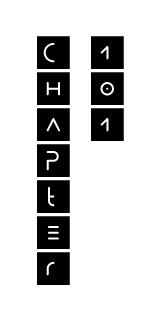
=
Between One and Zero is its own infinity. It is easy to forget this, while one is counting; in fact, one often forgets Zero altogether when starting off: one, two, three, four, etc. Or while counting for hide-go-seek: one one thousand two one thousand three one thousand etc. (or one mississippi two mississippi three mississippi etc.). But not when counting down: tenineightsevevsixfivefourthreetwonezero BLASTOFF!
=
So: the forgotten infinity between Zero and One: thankfully, Zeno commemorates this infinity with his paradox: split a distance in half, then split it in half again, and again, and again: at some point one comes down to one, then half, then quarter, then eight, then sixteenth, then thirty-second, etc. One quickly devolves into the infinity between Zero and One and then gets stuck there, halving away for all time, never reaching the destination (which, in this case, is Zero). Thus one might say that a tension exists between Zero and One, for "the twain never meet," they never touch, they never truly join in the space inbetween: like Dante's infernal lovers swirling around each other in the circle of Lust; or like binary stars circling each other for centuries, millenia, eons; or like a negatively charged electron cycling about a positively charged proton; or like gluons etc.
=
Zero and One: they could easily be the only pronouns, One being the preferred reference to the abstract singular (which, as one might remember from high school or college composition classes, must not be mixed with other pronouns once chosen, in order to be consistent and formal.), and None (or Zero) being the negation of One: the absence of One, the lack: No One, the O somehow dropping out over time, allowing the linguistic fusion of n and one: none: No need for the plural, for no true plurality ever exists: we are ever alone, attempting to cross the spaces between us: Language is the bridge we build toward the Other, and we're each building toward the middle from our lonely shore: every man--every human--is an island trying to be a continent.
=
No need for the plural, no need for first, second, or third person: only the zero person, the pronoun of abstraction: I am the one, I am no one: One and Zero. Nothing else.
=
return to rsmyth's homepage
rsmyth@anabiosispress.org